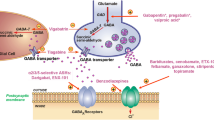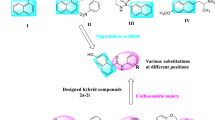Abstract
The role of the functional substituents on the pyridinium ring of bisquaternary pyridinium compounds, mostly oximes, in exerting reversible and irreversible inhibition of binding of [3H]-N-methyl-4-piperidyl benzilate ([3H]-4NMPB) to rat brain stem muscarinic receptors was studied. The drugs tested, i.e. HGG-42, HGG-12, HGG-52, HI-6, obidoxim, SAD-128 and TMB-4, could reversibly inhibit binding of [3H]-4NMPB, with the highest potency (KI=1.7–6 μM) exhibited by analogs possessing hydrophobic substituents at position 3 or 4 of the pyridinium ring. Bisquaternary drugs possessing an oxime moiety at position 2, but not at position 4 of the pyridinium ring, could also induce about 30% reduction of maximal binding capacity (Bmax) (loss of muscarinic receptors) in addition to their reversible effect. Thus the structural correlates of the reversible and the irreversible effects of these drugs are different.
Similar content being viewed by others
References
Amitai G, Kloog Y, Balderman D, Sokolovsky M (1980) The interaction of bis-pyridinium oximes with mouse brain muscarinic receptors. Biochem Pharmacol 29: 483–488
Dirks E, Scherer A, Schmidt M, Zimmer G (1970) Beziehung zwischen chemischer Structur and cholinesterase reaktivierender Wirkung bei einer Reihe Neuer unsymmetrischer Pyridiniumsalze. Arzneimittel Forsch 20: 55–62
Edery H (1983) Target sites for anticholinesterases, cholinolytics and oximes on ventral medulla oblongata. In: Schlafke ME, Koepchen HP, See WR (eds.), Central Neuron Environment, Springer-Verlag Berlin Heidelberg New York, pp 239–250
Ellin RI (1982) Anomalies in theories and therapy of intoxication by potent organophosphorous anticholinesterase compounds. Gen Pharmacol 13: 457–466
Gurwitz D, Sokolovsky M (1980) Agonist specific reverse regulation of receptors by transition metal ions and guanine nucleotides. Biochem Biophys Res Commun 96: 1296–1304
Kloog Y, Egozi Y, Sokolovsky M (1979) Characterization of muscarinic acetylcholine receptor from mouse brain: evidence for heterogeneity and isomerization. Mol Pharmacol 15: 545–558
Kloog Y, Sokolovsky M (1985a) Bisquaternary pyridinium oximes as allosteric inhibitors of rat brain muscarinic receptors: Selective effects on antagonist binding and loss of receptor binding sites. Mol Pharmacol (27: 418–428)
Kloog Y, Sokolovsky M (1985b) Allosteric interactions between muscarinic agonist binding sites and effector sites demonstrated by the use of bisquaternary pyridinium oximes. Life Sci (36: 2127–2136)
Kuhnen-Clausen D (1970) Investigation on the parasympatholitic effect of toxogonin on the guinea pig isolated ileum. Eur J Pharmacol 9: 85–87
Kuhnen-Clausen D (1972) Structure activity relationship of mono- und bis-quaternary pyridines in regard to their parasympatholytic effects. Toxicol Appl Pharmacol 23: 443–454
Kuhnen-Clausen D, Hagedorn I, Gross G, Bayer H, Hucho F (1983) Interactions of bisquaternary pyridine salts (H-oximes) with cholinergic receptors. Arch Toxicol 54: 171–179
Schoene K, Wolf R (1972) Retarding effect of pyridinium salt on Soman-inhibited acetylcholinesterase. Arzneimittel-Forsch 22: 1802–1803
Sidell FR, Graff WA (1970) Toxogonin: Blood level and side effects after intramuscular administration in man. J Pharm Sci 59: 793–797
Sokolovsky M (1984) Muscarinic receptors in central nervous system. Int Rev Neurobiol 25: 139–183
Wolthuis OL, Van der Wile HJ, Visser RPLS (1976) The dependence of the blood level of the oximes HS-6 on the severity of organophosphate poisoning. Eur J Pharmacol 39: 417–421
Author information
Authors and Affiliations
Rights and permissions
About this article
Cite this article
Kloog, Y., Galron, R., Balderman, D. et al. Reversible and irreversible inhibition of rat brain muscarinic receptors is related to different substitutions on bisquaternary pyridinium oximes. Arch Toxicol 58, 37–39 (1985). https://doi.org/10.1007/BF00292614
Received:
Accepted:
Issue Date:
DOI: https://doi.org/10.1007/BF00292614




